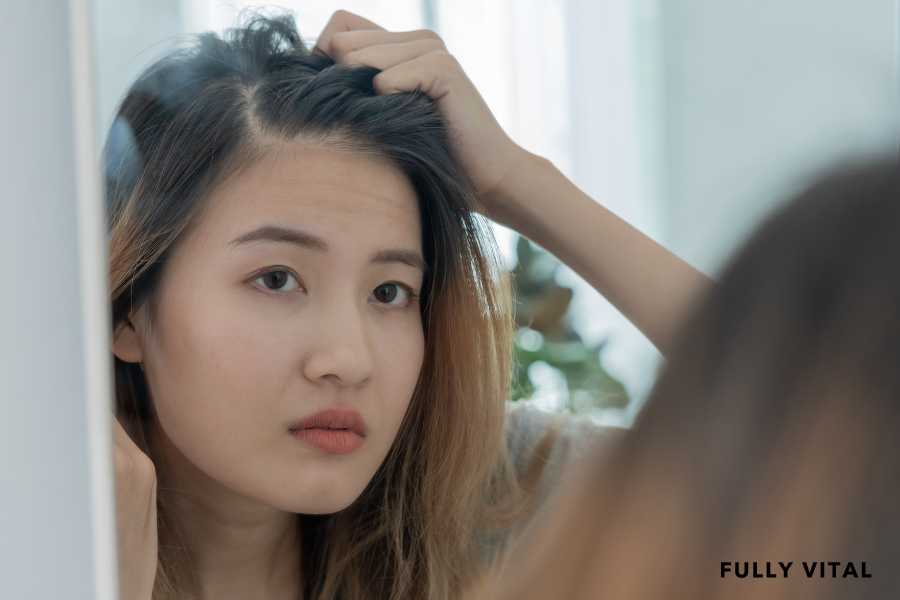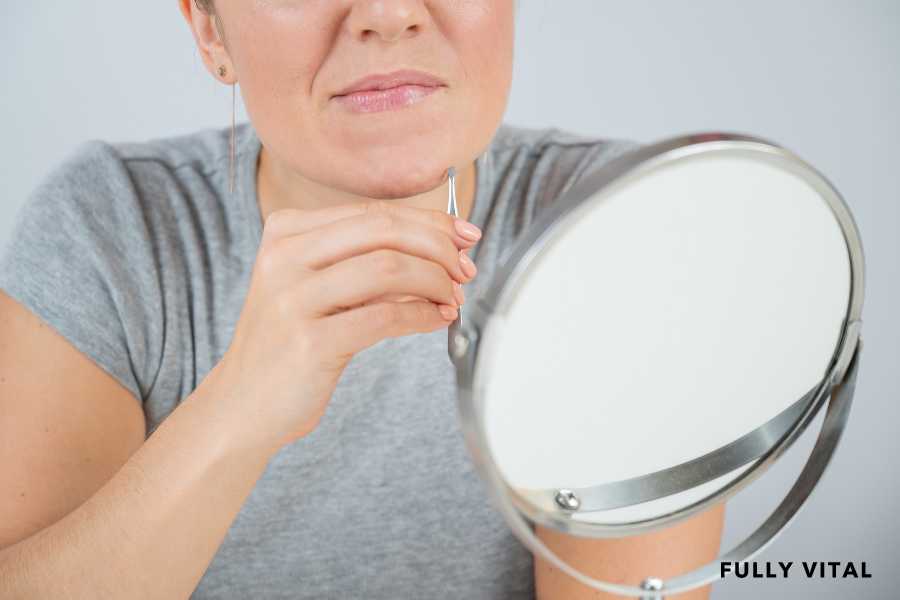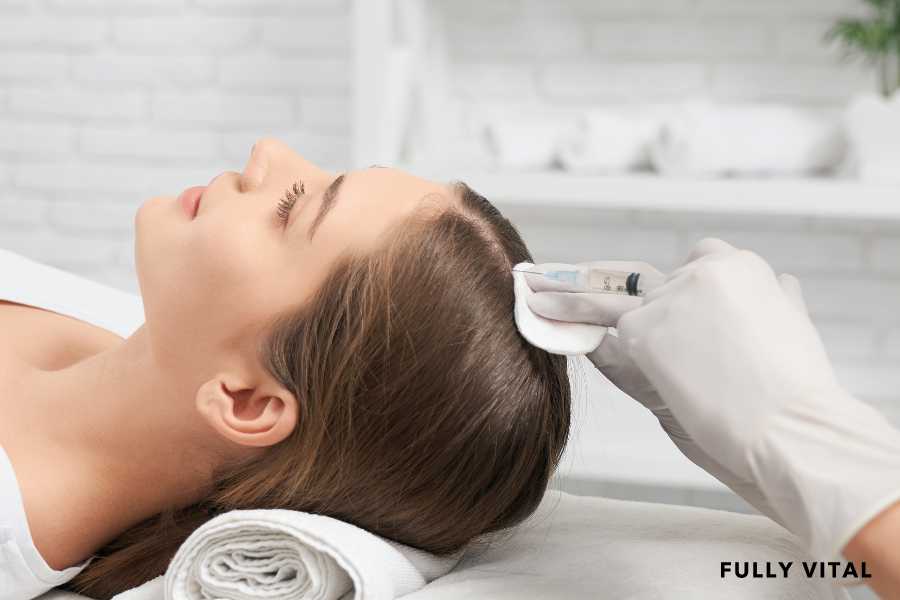
Unlocking The Link: Exploring The Connection Between Iron Deficiency And Hair Loss
In the pursuit of vibrant and healthy hair, it's crucial to understand the underlying factors that can lead to hair loss. One such factor that often goes unnoticed is iron deficiency.
This article delves into the intricate relationship between iron deficiency and hair loss, shedding light on how this deficiency can impact hair health and overall quality of life.

I LOVE MY HAIR NOW
FullyVital hair serum and hair vitamins made tremendous improvements in my hair. I truly love my hair now.
Dorit S.,
If you're a woman seeking to stimulate hair growth and restore your locks to their former glory, you're in the right place.
What Is Iron Deficiency Hair Loss?
Iron deficiency hair loss refers to the condition where inadequate levels of iron in the body contribute to hair thinning and shedding. Iron is a vital mineral for the growth and health of hair follicles.
When the body lacks sufficient iron, the hair growth cycle can be disrupted, leading to weaker hair strands and increased hair loss.1
Hair Growth And Hair Loss
Hair growth and hair loss are common topics related to the health and appearance of human hair.2
Here's some information about both:
Hair Growth
Hair growth is a natural process that occurs in cycles.
The hair growth cycle consists of three main phases:
-
Anagen Phase: This is the active growth phase of the hair follicle. During this phase, the hair grows steadily and can last for several years. The length of the anagen phase determines how long your hair can grow.
-
Catagen Phase: This is a transitional phase where the hair follicle starts to shrink and detach from the blood supply. It lasts for a couple of weeks.
-
Telogen Phase: Also known as the resting phase, this is when the hair follicle is inactive. After a few months, the hair sheds and the cycle begins again with a new hair strand growing from the same follicle.
Hair growth is influenced by various factors, including genetics, hormonal changes, age, diet, and overall health.
Generally, maintaining a balanced diet, staying hydrated, and practicing good hair care can contribute to healthy hair growth.
Hair Loss
Hair loss, or alopecia, is a common concern for many people.
There are several types of hair loss, and they can have different underlying causes:
-
Androgenetic Alopecia: This is often referred to as male or female pattern baldness. It's the most common cause of hair loss and is influenced by genetics and hormones. It typically leads to gradual hair thinning over time.
-
Telogen Effluvium: This type of hair loss occurs when there's a disruption in the normal hair growth cycle. It can be triggered by factors such as stress, illness, surgery, medications, or hormonal changes. Hair shedding increases, and it can be temporary.
-
Alopecia Areata: This is an autoimmune condition where the immune system attacks hair follicles, leading to sudden hair loss in small, round patches on the scalp or other areas of the body.
-
Scarring Alopecia: In this condition, inflammation damages the hair follicles, leading to permanent hair loss and scarring. It can result from various factors, including certain skin conditions and trauma.
-
Traction Alopecia: This type of hair loss is caused by constant pulling or tension on the hair, often due to hairstyles like tight braids, ponytails, or hair extensions.
The Link Between Iron Deficiency And Hair Loss
Iron deficiency can indeed be linked to hair loss.
Iron is an essential mineral that plays a crucial role in the body, including in the production of hemoglobin, a protein that carries oxygen to cells and tissues.
When the body lacks sufficient iron, it can lead to a condition called iron deficiency anemia.
This condition can have a range of effects on the body, including hair loss.3
Here's how iron deficiency can be related to hair loss:
Hair Growth Cycle Disruption
Iron deficiency can disrupt the normal hair growth cycle.
The anagen phase (active growth phase) of the hair cycle may be shortened, leading to premature shedding of hair strands.
This can result in overall thinning of the hair.
Reduced Oxygen Supply
Hemoglobin, which requires iron to function properly, is responsible for transporting oxygen to cells, including the hair follicles.
In cases of iron deficiency, there might be a reduced oxygen supply to the hair follicles, affecting their ability to produce healthy hair.
Miniaturization Of Hair Follicles
Iron deficiency can contribute to the miniaturization of hair follicles, causing the hair strands to become finer and weaker.
This can lead to a noticeable decrease in hair volume.
Telogen Effluvium
Iron deficiency can trigger a condition called telogen effluvium, which is characterized by a higher percentage of hair follicles entering the telogen (resting) phase simultaneously.
This can lead to increased shedding of hair.
Impact On Hair Health And Quality Of Life
Hair health can have a significant impact on a person's overall well-being and quality of life.
Here's how:
Self-Esteem And Confidence
Hair is often associated with attractiveness and self-image. Hair loss or poor hair health can lead to a decrease in self-esteem and confidence.
Many people feel a strong emotional attachment to their hair, and changes in its appearance can affect how they perceive themselves and how they believe others perceive them.
Psychological Well-Being
Hair loss can cause psychological distress, including feelings of embarrassment, anxiety, and even depression.
People may become self-conscious about their appearance and may avoid social situations or activities they once enjoyed due to concerns about their hair.
Social Interactions
Hair plays a role in how individuals present themselves to the world.
Hair loss can influence social interactions and interactions in professional settings.
People might feel uncomfortable or worried about how others perceive them, leading to a decrease in social engagement and networking opportunities.
Lifestyle Changes
Individuals experiencing hair loss might resort to changing their hairstyles, wearing hats or wigs, or using hair concealers to manage their appearance.
These changes can impact daily routines and require additional time and effort.
Personal Investment
People often invest time and money in hair care products, treatments, and styling. Hair loss or poor hair health can lead to frustration when these efforts do not yield the desired results.
Body Image
Hair is an integral part of an individual's body image.
Changes in hair health can affect how someone perceives their body and overall appearance.
Cultural And Societal Influences
In many cultures, hair is linked to identity, tradition, and beauty standards.
Hair loss can clash with these cultural norms and lead to feelings of detachment from one's cultural or societal identity.
Stress And Emotional Impact
The emotional toll of hair loss can contribute to increased stress levels, potentially exacerbating the issue.
Stress, in turn, can impact hair health, creating a cycle that can be challenging to break.

Diagnosis And Treatment
Hair loss, a common concern affecting both men and women, can be emotionally distressing:
Diagnosis of Hair Loss
Diagnosing the underlying cause of hair loss involves a comprehensive assessment of medical history, physical examination, and potentially, laboratory tests. Here's how the diagnosis process typically works:
-
Medical History: Your doctor will inquire about your medical history, family history of hair loss, recent illnesses, medications you're taking, and any significant life events or changes.
-
Physical Examination: A dermatologist will examine your scalp and hair, looking for patterns of hair loss, the condition of the scalp, and any signs of inflammation or skin disorders.
-
Pull Test: During a pull test, your doctor gently tugs on a few hairs to determine how easily they come out. Increased hair shedding might indicate certain types of hair loss.
-
Blood Tests: Depending on the suspected cause, your doctor may order blood tests to check for factors like iron levels, thyroid function, hormone levels (such as testosterone and DHT), and markers of inflammation.
-
Scalp Biopsy: In some cases, a small sample of your scalp might be taken for analysis under a microscope to determine the type of hair loss and its specific cause.
Treatment Options For Hair Loss
The treatment approach for hair loss depends on the underlying cause and the type of hair loss.
Here are some common treatment options:
-
Medications:
-
Minoxidil: Available over-the-counter, minoxidil is a topical solution or foam that can help slow hair loss and promote hair regrowth in some individuals.
-
Finasteride: This prescription medication is primarily used for male pattern baldness. It helps reduce the production of a hormone called DHT that contributes to hair loss.
-
Topical Corticosteroids: These anti-inflammatory medications are sometimes used to treat conditions like alopecia areata by reducing inflammation around hair follicles.
-
-
Hair Growth Treatments:
-
Platelet-Rich Plasma (PRP) Therapy: PRP involves injecting a concentrated solution of platelets from your own blood into the scalp to stimulate hair growth.
-
Laser Therapy: Low-level laser therapy (LLLT) devices can be used to stimulate hair follicles and promote hair growth.
-
-
Surgical Procedures:
-
Hair Transplant: In this procedure, hair follicles from areas with healthy hair growth are transplanted to areas with thinning or no hair. There are different techniques, including Follicular Unit Transplantation (FUT) and Follicular Unit Extraction (FUE).
-
-
Lifestyle and Dietary Changes:
-
Balanced Diet: Ensuring you're getting essential nutrients like iron, biotin, zinc, and vitamins can support overall hair health.
-
Stress Management: Stress reduction techniques, such as exercise, meditation, and relaxation, can help prevent stress-induced hair loss.
-
-
Cosmetic Solutions:
-
Wigs and Hairpieces: For individuals who want immediate coverage, wigs, hairpieces, and hair extensions can provide a cosmetic solution.
-
Camouflage Products: Hair fibers, sprays, and powders can temporarily conceal thinning areas and create the appearance of fuller hair.
-
What Are The Consequences Of Iron Deficiency Hair Loss?
The consequences of iron deficiency hair loss extend beyond aesthetics.
Individuals may experience lowered self-esteem, social withdrawal, and even anxiety or depression.
The emotional impact can lead to changes in lifestyle and personal habits as individuals try to cope with the hair loss.
Are There Any Drawbacks To Iron Deficiency Hair Loss?
Yes, there are drawbacks to iron deficiency hair loss. Beyond the emotional toll, hair health is indicative of overall well-being.
Iron deficiency itself can have negative effects on the body, and untreated hair loss might be a sign of underlying health issues.

What Are The Alternatives To Addressing Iron Deficiency Hair Loss?
Addressing iron deficiency hair loss involves more than just treating the external symptoms.
It's crucial to consult a healthcare professional to determine the underlying cause of iron deficiency.
Treatments may include dietary changes, iron supplements, and addressing any related health conditions.
Additionally, adopting a holistic approach to overall health can contribute to improved hair health and quality.
Unlock Vibrant Hair Vitality with Fully Vital!Discover the secret to youthful, vibrant hair with Fully Vital's advanced hair growth products. Our mission is to empower you with powerful, science-backed solutions that combat the signs of aging hair. Experience the Benefits:
Elevate your hair care routine to a new level of excellence with Fully Vital. Join us on the journey to radiant hair health and renewed confidence. Remember, caring for your locks is an investment in your well-being! |
Final Thoughts On Iron Deficiency Hair Loss
Understanding the intricate relationship between iron deficiency and hair loss is essential for both physical well-being and emotional harmony.
The impact of hair loss goes beyond appearance, affecting self-esteem and overall quality of life.
By recognizing the significance of maintaining proper iron levels and seeking timely treatment, individuals can take proactive steps to preserve their hair health.
At Fully Vital, we recognize the importance of nurturing a healthy relationship with your locks.
Our range of hair growth products is designed to combat the effects of aging on your hair, promoting vitality and confidence.
Embrace the journey to healthier hair and well-being, and remember that taking care of your locks means taking care of yourself.
Frequently Asked Questions About Iron Deficiency Hair Loss
Can iron deficiency hair loss affect men as well?
Yes, iron deficiency hair loss can impact both men and women.
While it might be more commonly associated with women, men can also experience hair loss due to iron deficiency.
Are there specific age groups more prone to iron deficiency hair loss?
Iron deficiency can affect individuals of all age groups. However, women during their reproductive years and elderly individuals are more susceptible.
Can hair loss due to iron deficiency be reversed with lifestyle changes alone?
In some cases, yes.
If the hair loss is primarily caused by iron deficiency, adopting a balanced diet rich in iron-containing foods can contribute to hair regrowth.
However, consulting a healthcare professional is advisable for a comprehensive approach.
What role do vitamins play in preventing iron deficiency hair loss?
Vitamins, especially vitamin C, aid in iron absorption.
Ensuring adequate vitamin intake alongside iron-rich foods can enhance your body's ability to absorb and utilize iron effectively.
Are there any side effects associated with iron supplements for hair loss?
While iron supplements can be effective, they may also cause digestive discomfort, such as nausea or constipation.
It's important to follow recommended dosages and consult a healthcare provider.
Can hair loss due to iron deficiency be sudden or is it a gradual process?
Hair loss due to iron deficiency can be gradual, occurring over several months.
Sudden hair loss might be attributed to other factors and should be assessed by a medical professional.
How can I track my iron levels to prevent deficiency-related hair loss?
Regular blood tests, such as a complete blood count (CBC) and ferritin levels, can help monitor your iron levels and detect deficiencies early.
Are there specific shampoos or hair treatments that can address iron deficiency-related hair loss?
While there are shampoos and treatments marketed for hair loss, addressing the root cause – iron deficiency – is crucial for effective and lasting results.
Is excessive hair shedding always a sign of iron deficiency?
Not necessarily.
While iron deficiency can lead to increased hair shedding, other factors such as stress, hormonal changes, and certain medical conditions can also contribute to hair loss.
How long should I continue iron supplementation after my hair regrows?
Consulting a healthcare professional is recommended to determine the appropriate duration for iron supplementation.
They can help assess whether your iron levels have normalized and whether ongoing supplementation is necessary for maintenance.
Sources:
-
Almohanna, H. M., Ahmed, A. A., Tsatalis, J. P., & Tosti, A. (2019). The Role of Vitamins and Minerals in Hair Loss: A Review. Dermatology and Therapy, 9(1), 51–70. https://doi.org/10.1007/s13555-018-0278-6
-
Nayak, B. S., Ann, C. Y., Azhar, A. B., Ling, E. C. S., Yen, W. H., & Aithal, P. A. (2017). A Study on Scalp Hair Health and Hair Care Practices among Malaysian Medical Students. International Journal of Trichology, 9(2), 58–62. https://doi.org/10.4103/ijt.ijt_76_16
-
Miller, J. L. (2013). Iron Deficiency Anemia: a Common and Curable Disease. Cold Spring Harbor Perspectives in Medicine, 3(7). https://www.ncbi.nlm.nih.gov/pmc/articles/PMC3685880/







